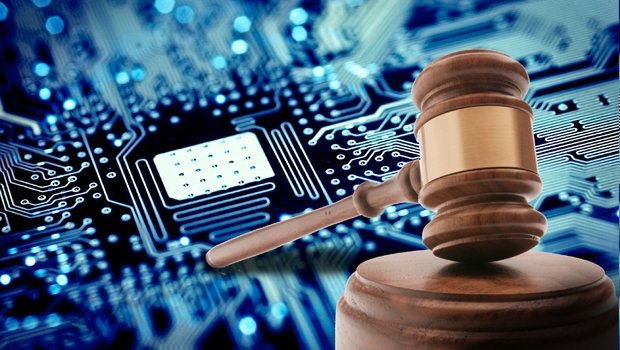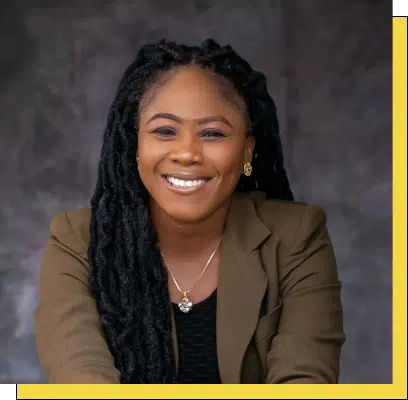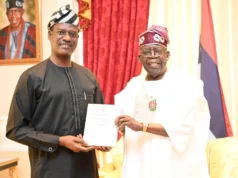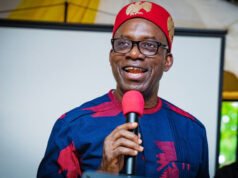When people imagine a lawyer in Nigeria, what usually comes to mind is a confident figure in a wig and flowing robe, standing before a judge, arguing passionately about justice. But for Motunrayo Adebayo, her path as a lawyer took a different turn — one that led her from courtrooms and case files to the complex world of cybersecurity and privacy.
Her story is not just about changing careers. It’s about foresight — seeing how the future of law, data, and technology would soon collide, and stepping forward before most of her peers realised it. In an era where privacy breaches and cyber threats dominate headlines, her move from being a practising lawyer to a cybersecurity professional couldn’t have been more timely.
Table of Contents

Why Privacy Is Now Every Company’s Business
In her current role, Adebayo helps startups and companies understand that privacy is not just a “compliance requirement” — it’s a business survival strategy. “You can’t build trust without protecting user data,” she often says. For her, privacy is a bridge between technology and accountability.
She spends her days helping businesses build privacy frameworks, mapping out how data flows through departments, and identifying weaknesses before regulators or hackers do. Many companies, especially startups, don’t realise that a single privacy lapse can destroy their reputation overnight.
“A company’s leadership must take privacy seriously,” she insists. “Once top management understands the risks, the entire organisation follows suit.”
She recalls walking into an office where confidential documents — résumés, ID copies, and personal data — were left unattended on desks. In another case, she saw paper CVs being sold by roadside vendors as wrapping materials. “That was when it hit me how much we undervalue data privacy in Nigeria,” she says.
Her recommendations were simple but firm: digitise sensitive information, restrict access to authorised staff only, and destroy hard copies properly. These small but critical steps can protect thousands from identity theft and data misuse.
Adebayo’s work demonstrates that cybersecurity isn’t just about systems — it’s also about people, habits, and awareness.

How a Lawyer Found Her Way into Cybersecurity
Adebayo’s transformation didn’t happen overnight. She had always been a meticulous lawyer, fascinated by compliance and regulation. Over time, her work began intersecting with IT consulting projects. She realised that her legal expertise could be invaluable in an industry that desperately needed clarity on laws and ethics.
Instead of pursuing another degree in law, she decided to earn a master’s degree in information security — a bold step for a lawyer used to statutes and case precedents. “It was the best decision I ever made,” she says. “It allowed me to combine my legal reasoning with technical understanding.”
Now, her job involves ensuring companies have robust systems in place: proper encryption, network security, and data protection policies. She might not write code, but she interprets laws that dictate how digital systems should behave — a skill few traditional lawyers possess.
She’s also deeply interested in how artificial intelligence (AI) interacts with privacy. She cites a disturbing global case where a chatbot allegedly encouraged a user to commit suicide, sparking legal debates about responsibility and data ethics. “We need clear frameworks around AI,” she explains. “If a lawyer doesn’t understand the technology, how can justice be served in such cases?”
In Nigeria, regulatory authorities like the NDPC are still growing, but Adebayo is optimistic. She believes that stronger data laws and awareness campaigns will eventually make privacy a cultural norm, not just a compliance checkbox.
Between Nigeria and the U.S.: A Tale of Two Work Cultures
Having worked in both Nigeria and the United States, Adebayo draws sharp contrasts. In Nigeria, she recalls the lack of formal contracts, long hours without compensation, and bosses who confused busyness for productivity. “As a lawyer, I was used to working late,” she says, “but even outside law, the culture can be extreme.”
In the U.S., things are different. Contracts are detailed, boundaries are respected, and extra hours are often compensated. “Here, systems work,” she says simply. “Companies are cautious because they know one misstep could lead to a lawsuit.”
She doesn’t see the Nigerian system as hopeless, though. Rather, she believes that professionals like her — a new generation of lawyers and cybersecurity experts — can help change how Nigerian organisations approach structure, privacy, and accountability.
“Regulation should not be seen as punishment,” she says. “It’s a guide that helps businesses operate safely.”
Now, as a privacy professional abroad, Adebayo still finds herself being the lawyer in the room — interpreting policies, drafting compliance documents, and bridging the gap between legal obligations and technical reality. Her legal background gives her a rare advantage in cybersecurity, where precision and ethics are everything.
For young Nigerian lawyers looking for new challenges, she offers this advice: “Don’t box yourself into traditional roles. The future of law is tech-driven. Whether it’s cybersecurity, AI, or digital forensics — the skills of a lawyer are still needed, just in new arenas.”

Conclusion
Adebayo’s story reflects a larger truth about Nigeria’s evolving workforce. As digital transformation accelerates, the nation needs professionals who understand both law and technology. Her journey — from wig and robe to encrypted servers and compliance reports — shows that one can uphold justice even without standing before a judge.
In a world where data is the new oil, lawyers like Motunrayo Adebayo are proving that the law must not only defend rights but also protect bytes.
Join Our Social Media Channels:
WhatsApp: NaijaEyes
Facebook: NaijaEyes
Twitter: NaijaEyes
Instagram: NaijaEyes
TikTok: NaijaEyes




